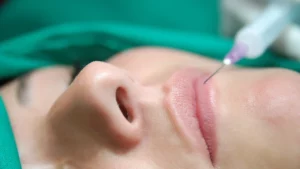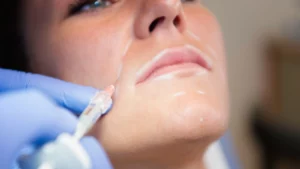Table of Contents
Tooth grinding, medically known as bruxism, is an involuntary habit of clenching, grinding, or gnashing your teeth. This condition can occur during the day (daytime grinding) or at night (night grinding) and is often linked to underlying factors such as stress, misaligned teeth, or sleep disorders. While it might seem harmless, persistent tooth grinding can result in severe complications, including jaw pain, headaches, and even damage to your teeth and gums.
This article explores the causes, symptoms, complications, and modern treatments for tooth grinding, including innovative solutions like Botox and Dysport.
Understanding Tooth Grinding (Bruxism)
Tooth grinding is a repetitive, unconscious activity that exerts excessive force on the teeth and surrounding jaw structures. It’s one of the most common sleep-related movement disorders and can also manifest as a stress-induced habit during waking hours.
Types of Tooth Grinding
- Night Grinding (Sleep Bruxism):
- Occurs during sleep and is often associated with other sleep disorders like obstructive sleep apnea (OSA).
- Most individuals are unaware they grind their teeth at night until symptoms like jaw pain or tooth damage emerge.
- Daytime Grinding (Awake Bruxism):
- Happens during conscious hours, usually triggered by stress, concentration, or habit.
- It involves jaw clenching rather than full grinding motions.
The Science Behind Bruxism
Understanding what happens in your body during grinding episodes helps explain why treatment is crucial. During an episode of jaw clenching, the temporomandibular joints (TMJ) and associated muscles work overtime. These powerful muscles, designed for chewing food, can exert enormous pressure when activated during grinding episodes:
The masseter muscle, responsible for closing your jaw, is one of the strongest muscles in your body relative to its size. During bruxism episodes, this muscle can generate forces between 20-250 pounds of pressure per square inch. Compare this to normal chewing, which typically requires only 20-40 pounds of pressure.
What Causes Tooth Grinding?
Several factors contribute to bruxism, ranging from emotional triggers to physical conditions. Understanding these causes is essential to address the condition effectively.
1. Stress and Anxiety
Chronic stress and anxiety are the most common triggers for teeth clenching and grinding. Stressful situations can lead to subconscious jaw tension, resulting in habitual grinding.
2. Sleep Disorders
Conditions like sleep apnea or snoring can increase the likelihood of night grinding as the body reacts to interrupted breathing patterns.
3. Misaligned Teeth (Malocclusion)
Improper alignment of the upper and lower teeth creates uneven pressure during chewing, leading to involuntary jaw clenching.
4. Medical Conditions and Genetics
- Neurological conditions such as Parkinson’s disease can cause tooth grinding.
- Certain medications, especially antidepressants, may have bruxism as a side effect.
- A family history of bruxism increases the likelihood of developing the condition, suggesting a genetic predisposition.
Symptoms of Tooth Grinding
- Jaw Pain or Soreness: Persistent discomfort in the jaw muscles, especially upon waking.
- Tooth Damage: Flattened, chipped, or fractured teeth are telltale signs of grinding.
- Headaches: Frequent tension headaches, particularly in the morning, are linked to jaw clenching.
- Ear Pain: Discomfort around the ears without any infection could indicate grinding-related jaw tension.
- Clicking or Popping Sounds: Audible clicks when moving the jaw may signal joint strain caused by grinding.
- Sleep Disruption: Night grinders often wake up feeling unrested, contributing to daytime fatigue.
The Impact of Chronic Grinding
Short-term Effects
The immediate impacts of tooth grinding include:
Morning headaches occur because the temporal muscles, which help control jaw movement, become fatigued and strained during night grinding episodes. This muscle tension can trigger tension headaches that typically start at the temples and radiate across the head.
Long-term Consequences
Chronic bruxism can lead to several serious conditions:
The constant pressure from grinding can wear down tooth enamel, the hardest substance in your body, at a rate up to ten times faster than normal wear. This accelerated wear can lead to increased sensitivity, altered bite patterns, and potentially serious dental problems.
Botox and Dysport: Advanced Solutions for Tooth Grinding
Both Botox and Dysport are neuromodulators that work by temporarily relaxing the masseter muscles, the primary muscles involved in jaw clenching and grinding. These treatments reduce the intensity of muscle contractions, alleviating the symptoms of bruxism.
At Isya Aesthetics, under the expertise of Dr. Kiran Sethi, masseter Botox has become a transformative treatment not only for reducing the effects of bruxism but also for achieving a slimmer, more sculpted jawline.
How It Works
Botox (Botulinum Toxin Type A) and Dysport are FDA-approved for several medical and aesthetic conditions. When injected into the overactive masseter muscles, they block nerve signals responsible for muscle contraction, leading to reduced tension and a more relaxed jaw.
Masseter’s Botox Procedure
Consultation: Dr. Kiran Sethi conducts a thorough consultation to understand your bruxism severity, facial anatomy, and aesthetic goals. For more information call us now.
Injection Process:
- Small doses of Botox or Dysport are injected into the masseter muscles using ultra-fine needles.
- The procedure takes about 15–20 minutes and does not require anesthesia.
Post-Treatment: Patients can return to their daily activities immediately. There’s no downtime, though minor swelling or tenderness may occur temporarily.
Benefits
- Reduces jaw pain and tension
- Minimizes tooth wear and damage
- Alleviates TMJ symptoms
- Improves facial aesthetics by slimming the jawline
- No need for surgery or extended recovery time.
- The treatment is minimally invasive and delivers results within a few weeks.
Who Is It Ideal For?
Botox and Dysport for bruxism are suitable for:
- Individuals with chronic bruxism unresponsive to mouthguards or lifestyle changes.
- Those experiencing TMJ pain, frequent headaches, or muscle tension from jaw clenching.
- Patients seeking both medical and cosmetic benefits, such as relief from grinding and a more defined facial contour.
Why Choose Isya Aesthetics for Masseter Botox?
About Dr. Kiran Sethi
Dr. Kiran Sethi, MD, is a globally-regarded expert in aesthetics, skincare, wellness, and IV nutrition. Her arc extends from New York, where she was born, raised and trained, to New Delhi where she currently practices from Isya Aesthetics, her multi-specialty clinic. This Columbia University graduate is also the best-selling author of Skin Sense.
She has been awarded best skin expert many times over and her clinic is top rated by Times of India and many magazines. She is frequently featured in leading publications such as Elle, GQ, and Grazia, and on TV with CNN, NDTV, Aaj Tak and more.
Preventing tooth grinding
Preventative measures can reduce the severity or frequency of bruxism:
- Reduce Stress: Practice relaxation techniques like deep breathing or progressive muscle relaxation.
- Avoid Stimulants: Limit caffeine, nicotine, and alcohol intake, especially in the evening.
- Protect Your Teeth: Use custom-fitted mouthguards as recommended by your dentist.
- Regular Checkups: Routine dental visits can detect early signs of tooth grinding, enabling timely intervention.
Conclusion
Tooth grinding, or bruxism, is a condition that affects millions of people worldwide, often silently damaging teeth and causing chronic pain. While it has various causes, ranging from stress to sleep disorders, effective treatments like mouthguards, Botox, and Dysport offer relief and protection. By recognizing the symptoms and addressing the underlying causes, individuals can prevent complications and maintain optimal oral health.
If you suspect you have teeth clenching or grinding, consult a dental or medical professional to explore personalized treatment options.
1. Can stress cause tooth grinding?
Yes, stress is one of the leading causes of bruxism, often triggering involuntary jaw clenching and grinding.
2. Is tooth grinding at night more harmful than daytime grinding?
Both can be harmful, but night grinding is often harder to control as it occurs unconsciously, leading to greater tooth and jaw damage over time.
3. How effective is Botox for tooth grinding?
Botox effectively reduces jaw tension, minimizing grinding-related complications like tooth wear and TMJ pain. Results typically last 3–6 months.
4. What are the risks of untreated bruxism?
Untreated bruxism can lead to tooth damage, gum recession, TMJ disorders, chronic headaches, and jaw pain.
5. Can lifestyle changes stop tooth grinding?
Lifestyle changes, such as stress management and reducing caffeine intake, can significantly reduce the frequency and severity of teeth clenching and grinding.
6. How quickly can I expect relief from Botox or Dysport treatments?
Most patients notice significant reduction in grinding and associated pain within 1-2 weeks after treatment, with full effects typically achieved by week 2-3.







